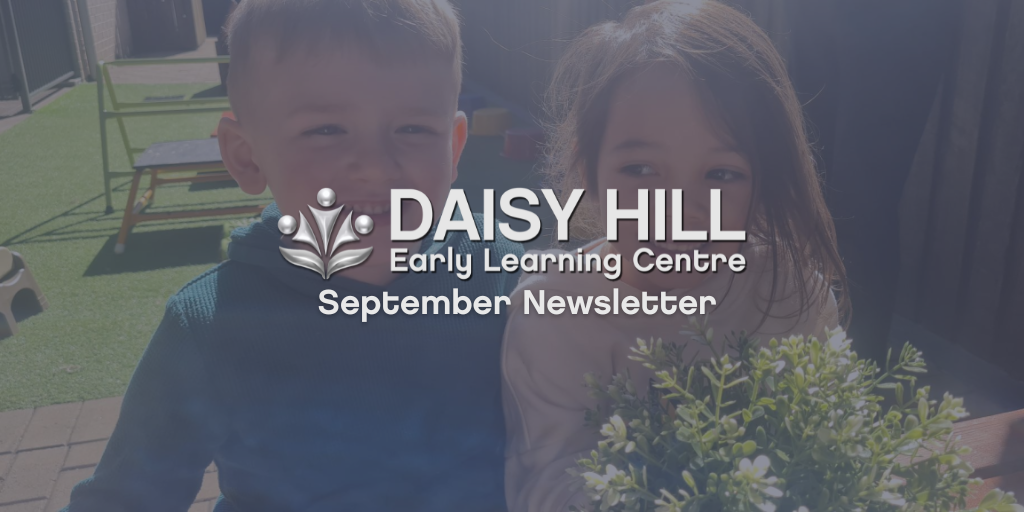Hello everyone from our Daisy Hill Early Learning Centre!
Toddler TIME!
Hi there and WELCOME to our new friends!
We feel it’s important to take the time to reflect on the learning that has taken place recently. This process allows educators to recognise the achievements of the children and themselves while providing valuable information for future planning. We have been focusing on children being independent, teaching them self-help skills. The children have been practising dressing themselves, hygiene skills and being responsible for their own learning environment which includes packing resources away.
We have also started to focus on number and repetitive games to enhance these skills. When the children are washing their hands or having a nappy change the educators will engage them with number songs.
Hi from the Junior Kindy Class!
As you may have seen from our room, we have been Focusing on our cultures and what makes us special. It has been so wonderful learning about all the wonderful culturally diverse backgrounds we have in our centre.
The children have also really enjoyed learning about all the colours as each day we have observed the children talking to their friends about what colour clothes they are wearing.
Our aim for this month is to create engaging experiences and spaces for the children to enjoy. We also want to teach the children self-help skills such as wiping their own face/nose, putting their scraps in the bin, and washing their hands.
NEWS FROM THE OFFICE!
Another great month. This year is just flying by, I cannot believe that it is nearly October! This must mean we’re just having too much fun.
If possible, Like us on Facebook to stay up to date with current centre news and information.
As promised…Thank you to the children that have been so proactive in putting their sunscreen on every day! We have some very sun-smart cookies!
Why loving, nurturing relationships are important for child development?
Children’s relationships shape the way they see the world and affect all areas of their development. Through relationships with parents, other family members and carers, children learn about their world.
Exploring the world gives your child new experiences. Your child needs the stimulation of these experiences to learn how to think, communicate, react and socialise. The more experiences your child has with you there to support them, the more your child grows and thrives.
Why is play essential for development and relationships?
In the early years, your child’s main way of learning and developing is through play! Play is fun for your child. It also allows your child to explore, observe, experiment, solve problems and sometimes make mistakes.
By building a warm, positive and responsive relationship with your child now, you’re helping shape the adult your child will become and giving your child a solid foundation for the rest of their life.
References
Ford, A.L.B., Elmquist, M., Merbler, A.M., Kriese, A., Will, K.K., & McConnell, S.R. (2020). Toward an ecobehavioral model of early language development. Early Childhood Research Quarterly, 50, 246-258. doi: 10.1016/j.ecresq.2018.11.004.
Julian, M., Lawler, J., & Rosenblum, K. (2017). Caregiver-child relationships in early childhood: Interventions to promote well-being and reduce the risk for psychopathology. Current Behavioral Neuroscience Reports, 4(2), 87-98. doi: 10.1007/s40473-017-0110-0
Sustainability Practices in Childcare
What does it all mean man?
Sustainability in early childhood education is an important part of the curriculum and should be incorporated into each and every service setting.
What is Sustainability?
Sustainability is “environment education”. Learning about the environment and how natural systems function. It’s everything that we need for our survival and well-being relating directly to our natural environment.
Sustainable Education
As educators, we need to include education about and for the environment which may include:
As Educator we will:
- Engage children in discussions about sustainable practices. Such as noticing how a garbage bin is full, how food and scraps are left over after meal times etc.
- Encourage children to participate in a recycling program (recycling bins for cardboard, plastic and paper) or involve them in developing new strategies for recycling materials (using donated materials for art n crafts or donating materials to council clean ups etc.)
- For older children, environmental issues such as drought or daily weather reports including updates on air quality and pollution levels should be discussed during morning group time or and a chart to record these findings should be made as visuals within the room.
- For Preschoolers, choose “Energy Savers” – responsible for noticing lights, fans and other appliances left on when not in use. Likewise, choose ‘Water Savers” – responsible for noticing taps left on and other wasted water.
centres, set up displays of sustainability messages that can be easily seen by families. Include locally relevant issues and information (local plants and wildlife, local bin colours and recycling systems
Sustainable Practices in Childcare
The NQS states that services take an active role in caring for the environment and contribute to a sustainable future (standard 3.3). One of the ways this is achieved is by minimising waste, reducing energy and water consumption and using fewer toxins. Here are some ideas to ensure sustainable practices are embedded in service operations:






